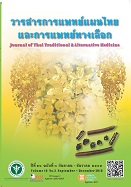Traditional Thai Medical Perspectives on Liver Cancer and Its Treatment: Results of a Qualitative Study
Main Article Content
Abstract
Liver Cancer is the first leading cause of death in Thailand. For some reason that current conventional medicine has some limitations for cancer treatment. Since traditional Thai medicine has been brought back into Thailand’s healthcare system which different from conventional medicine in terms of Thai traditional is aiming to normalize the inner elements of human body naturally. This research objective is therefore to deliver knowledges and treatments of the disease which relate to traditional Thai medical science. This research is a qualitative research composed of 1) a documentary research method which was done by collecting and analyzing relevant information from official classical traditional Thai medical textbooks, and 2) a making knowledge explicit method by in-depth interviewing and analyzing documents written by seven traditional Thai medicine experts residing in Bangkok and perimeter areas. Content analysis was applied to data collected from both methods. The research findings indicate that genetic, health-risk behaviors, and microorganisms are the major factors of common diseases that can be aggravated to chronic diseases if proper treatments are not applied. These chronic diseases may lead to the deterioration of pathavi dhatu (earth element) in the body, including yakanang (liver and related organs responsible for metabolism), that is named kasai disease. Without proper treatment, phi phai nai (inner pock) may be developed. Liver cancer is the final stage of this disease progression. The systematic examination, diagnosis and treatment of liver cancer according to traditional Thai medicine are the process that is based on principle of tri samutthan. Usage of drugs for purging harmful substances out of body, decreasing body and liver heat, nourishing liver and blood, treating malignant tumor with mao bau drugs, and igniting the digestive fire to normalize the function of four body elements, are the major methods of treatments. This process needs individualistic evaluation of bodily strength and illness condition of each patient. This study suggests that the clarification of disease’s causes and progression based on dhatu theory is essential for more specific examination and diagnosis of disease. This will provide the information needed for identifying disease etiology according to principle of traditional Thai medicine. In addition, the study design for the research on cancer treatment should be done collaboratively with experienced traditional Thai medical experts so that appropriate evaluation method would be found out.
Article Details
References
2. Yotsatian K, Worakunphanit W, Thirachaisakun M, Satianrat P. Benchaamarit formulae for liver cancer patients: Safety and quality of life. Journal of Thai Traditional & Alternative Medicine. 2017;15(3):301-11. (in Thai)
3. Fønnebø V, Grimsgaard S, Walach H, Ritenbaugh C, Norheim AJ, MacPherson H, et al. Researching Complementary and alternative treatments - the gatekeepers are not at home. BMC Medical Research Methodology. 2007;7:7.
4. Kienle GS, Albonico HU, Fischer L, Frei-Erb M, Hamre HJ, Heusser P, et al. Complementary therapy systems and their integrative evaluation. Explore: The Journal of Science and Healing. 2011;7(3):175–87.
5. Rongrian phaet phaenboran Wat Phra Chetuphon (Wat Pho). Tamraya Sila Charuek Nai Wat Phra Chetuphon Wimolmangklararm. Bangkok: Nam-akson Kanphim; 2015. (in Thai)
6. Phitsanuprasatwet, Phraya. Phaetsatsongkhro Vol 1. Bangkok: Supphakanchamrun; 1908. (in Thai)
7. Phitsanuprasatwet, Phraya. Phaetsatsongkhro Vol 2. Bangkok: Supphakanchamrun; 1908. (in Thai)
8. Rongrian phaet phaenboran Wat Phra Chetuphon Wimolmangklararm Rachaworamahawihan. Phaetsatsongkhro̜ Vol 3. Bangkok: Phaisansinkanphim; 1976. (in Thai)
9. Phitsanuprasatwet, Phraya. Wetsưeksa Phaetsatsangkheb Vol 1, 2, 3. Bangkok: Supphakanchamrun; 1908. (in Thai)
10. The Royal Society Thai Traditional Medicine and Pharmacy Dictionary B.E.2556. 1st ed. Bangkok: Samnakkitchakan rongphim Ongkanthahanphansưek; 2013. (in Thai)
11. Yothaphitak, Khun. Tamra Phaet Phaenboran. Bangkok: Samnakphimbannasin, 1973 (in Thai)
12. Sophitbanarak, Khun. Khampi Phaet Thai Phaen Boran Vol 3. Bangkok: Samakhom Phaesat Lae Ayuravet Boran Haeng Phrathet Thai; 1961. (in Thai)


